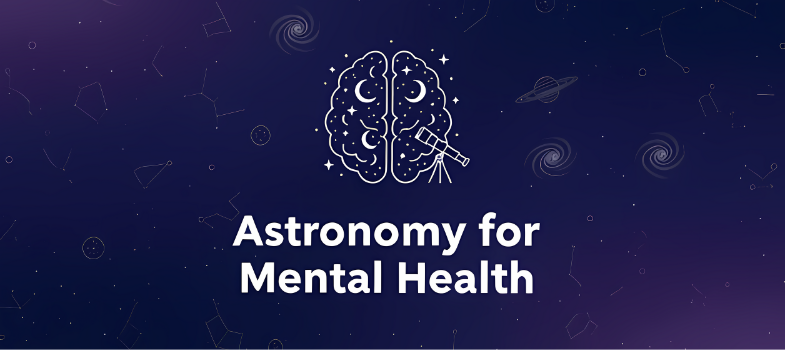Astronomy for Mental Health and Well-being (Part 2)
Evidence and Examples
Iconic Images: The Power of Perspective
Before we dive into practice, we must recognize two images that changed human psychology forever. These are cognitive triggers that shift how we view ourselves and our world.
The Earthrise (1968)

Image caption: Apollo 8 image of "Earthrise".
Taken by the Apollo 8 crew, this image showed Earth as a vibrant, blue marble rising over a barren lunar surface. This catalyzed what psychologists call the Overview Effect (Yaden et al., 2016).
-
The Logic: Seeing the planet as a borderless, fragile whole creates an immediate sense of unity. This expands perspective, which reduces the perceived weight of personal stress and improves overall mood.
The Pale Blue Dot (1990)

Image caption: Photograph of Earth taken on Feb. 14, 1990, by NASA’s Voyager 1 spacecraft.
Captured by Voyager 1 from 6 billion kilometers away, Earth appears as a single pixel of light. As Carl Sagan noted, this image highlights the "folly of human conceits."
-
The Logic: In a wellness context, this facilitates de-centering. By realizing the vastness of the cosmic arena, a participant can step back from personal distress and see their life within a much larger and more stable timeline.
A Conceptual Framework for Astronomy in Practice
To move beyond surface-level examples, we use this model to understand the underlying psychological mechanisms at play.
1. Sensory Grounding: Managing Trauma and Anxiety
For individuals experiencing trauma, the internal world often feels chaotic and unsafe. Astronomy provides External Sensory Grounding.
-
The Mechanism: Trauma survivors often struggle with "Internal Awareness" because their body sensations are tied to painful memories. Astronomy uses External Anchors like the visual steadiness of a planet or the rhythmic phases of the Moon.
-
The Outcome: By focusing on a distant, safe object, the participant anchors their nervous system in the present moment. This creates Psychological Distance, allowing the body to enter a state of calm without the immediate pressure of facing internal trauma.
2. Emotional Regulation: The Awe-Relaxation Loop
Planetarium sessions and guided stargazing use the environment to trigger the Parasympathetic Nervous System.
-
The Mechanism: The combination of low light and the vastness of a star field encourages Soft Fascination (Kaplan, 1995).
-
The Logic: Unlike "Hard Fascination," such as watching a loud action movie or scrolling through social media, soft fascination allows the "directed attention" of the brain to rest. This reduces mental fatigue, lowers cortisol levels, and improves the ability to regulate emotions.
3. Research Evidence: Environment and Attentional Recovery
Research shows that exposure to restorative natural environments—including the night sky—helps restore the brain's capacity to focus and process information (Berto, 2005).
-
The Insight: Experimental data confirms that simply viewing "high-restorative" scenes leads to measurable recovery from mental fatigue.
-
Urban Accessibility: This research highlights a critical equity issue. Light pollution is a mental health barrier. Disconnection from the sky reduces the opportunity for natural recovery, particularly in urban areas, making "Dark Sky Advocacy" a vital part of community well-being.
4. Community Connection: Building Social Capital and Resilience
Astronomy acts as the “social glue” that builds communal resilience, particularly in non-Western settings where well-being is a shared responsibility.
-
The Mechanism: These events foster Collective Effervescence, the sense of belonging that arises when a group focuses on the same grand object.
-
The Logic: By sharing indigenous star lore and storytelling, facilitators reinforce the idea that the community has survived and thrived for generations under these same stars. This builds Prosociality, encouraging members to support one another and strengthening the social fabric.
Summary of Mechanisms
|
Goal |
Category |
Logic Flow |
|
Reduce Stress |
Emotional Regulation |
Soft Fascination → Attention Rested → Lower Cortisol |
|
Handle Trauma |
Sensory Grounding |
External Anchor → Present Moment Awareness → Safety |
|
Build Belonging |
Community Connection |
Shared Awe → Collective Effervescence → Resilience |
|
Improve Outlook |
Research Evidence |
Restorative Environment → Mental Recovery → Perspective |
References & Bibliography (APA 7)
-
Berto, R. (2005). Exposure to restorative environments helps restore attentional capacity. Journal of Environmental Psychology, 25(3), 249 to 259. https://doi.org/10.1016/j.jenvp.2005.07.001
-
Kaplan, S. (1995). The restorative benefits of nature: Toward an integrative framework. Journal of Environmental Psychology, 15(3), 169 to 182. https://doi.org/10.1016/0272-4944(95)90001-2
-
Piff, P. K., Dietze, P., Feinberg, M., Stancato, D. M., & Keltner, D. (2015). Awe, the small self, and prosocial behavior. Journal of Personality and Social Psychology, 108(6), 883 to 899. https://doi.org/10.1037/pspi0000018
-
Yaden, D. B., Iwry, J., Slack, K. J., Eichstaedt, J. C., Hineline, F. E., & Newberg, A. B. (2016). The overview effect: Awe and self-transcendent experience in space exploration. Psychology of Consciousness: Theory, Research, and Practice, 3(1), 1 to 11. https://doi.org/10.1037/cns0000086
